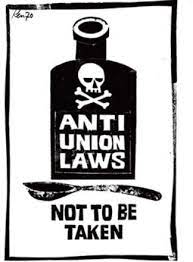The government has now set the minimum service levels in three of the sectors covered by the new Strikes (Minimum Service Levels) Act.
For Border Force and some HM Passport Office staff, the minimum service stipulates that services “should be provided at a level that means they are no less effective than if a strike were not taking place”, and must “ensure all ports and airports remain open.”
For ambulance staff, the minimum service level says “vital services” must continue “throughout any strike”, with all life-threatening calls, or calls “where there is no reasonable clinical alternative to an ambulance response” are responded to.
For passenger rail, the minimum service level has been set at 40% of timetabled train services. For strikes by rail engineering and infrastructure workers, the minimum service level stipulates that services must be able to run on a series of “priority routes”, between 6am and 10pm.
The government’s wording is less than specific. What does “a level that means they are no less effective than if a strike were not taking place” actually mean? On the rail, how does a requirement to run 40% of timetabled services translate into determining a staffing complement involving signalling and maintenance staff, as well as station staff and train crew?
The legislation itself gives the government license to be unclear, because the responsibility for issuing the “work notices” that specify the staffing required, and will actually compel workers to attend work, lies with individual employers. The Act says employers “may” issue work notices, but not that they must. That means there is significant scope for labour-movement campaigning to demand that employers refuse to do so.
The Scottish government has already said it will not comply with the legislation, by not issuing work notices. This means that, for example, workers on government-run ScotRail services will be unaffected by the law and can continue with all-out strikes. Other public authorities run by parties that oppose the Act should make a similar commitment — for example, Sadiq Khan’s mayoralty in London. Khan is the chair of the Transport for London board; a commitment from him that TfL and subsidiary companies such as London Underground Ltd. will refuse to issue work notices would have a major impact.
Our unions must campaign to demand these commitments, but we can’t rely on them. We also need organisation to prepare direct defiance if work notices are issued. Individual workers defying work notices in ones and twos could be picked off — mass defiance will, obviously, be immeasurably more powerful.
The Trades Union Congress has called a special congress for 9 December to discuss resistance to the laws. That’s an important step and could be an important forum for discussion and coordination. But the congress is only scheduled to take place from 10am to 1pm; how much can really be discussed or decided in three hours? Union branches, Trades Council, and regional and national bodies within unions must also call meetings to discuss and plan campaigning. The meeting called by Battersea and Wandsworth Trades Council on 29 November is one example.
Currently, Labour is committed to repealing the Act when next in government, as well as the 2016/7 Trade Union Act which legislated for turnout thresholds in ballots. But without pressure, it will go no further, and may renege on even these commitments. A new initiative from the Greater London Combined branch of the CWU aims to mobilise union bodies to apply that pressure.
The labour movement as a whole needs a three-fronted campaign: holding Labour to its commitments and pushing them further; demanding employers refuse to issue work notices; and preparing mass defiance if and when work notices are issued.
Free Our Unions aims to empower rank-and-file union activists — with briefings, bulletins, model motions, and other resources — to push within their unions for increased activity on this issue. The new laws are not only an attack on workers’ rights, but an attack on democracy.
